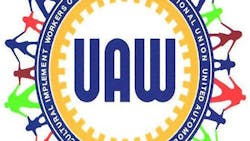UAW Close to Big Win Thanks to VW
DETROIT -- American labor leaders are closing in on a decades-long goal of organizing a factory run by a foreign automaker, thanks to a bridgehead opened up at Volkswagen.
While a vote has not yet been scheduled, the United Auto Workers says that a majority of the 1,700 workers at VW's plant in Chattanooga, Tennessee have signed cards asking for union representation.
A win at VW would increase pressure on fellow German automakers BMW and Daimler AG to open the door to unionization efforts at their U.S. facilities.
It could even boost the union's claims for recognition at factories run by Japan's Nissan, Honda and Toyota and South Korea's Kia and Hyundai.
Despite strong traditions of organized labor in their home countries, German, Japanese and South Korean automakers have strongly resisted unionization efforts in the United States.
Most of their plants are located in southern states where anti-union sentiments run high and 'right to work' laws make it difficult for unions to get a foothold.
The foreign carmakers have also kept workers satisfied by offering wages and benefits that are in line with, or even exceed, those won by unions at General Motors, Ford and Chrysler plants.
But European unions -- facing plant closures at home amidst a deep and lengthy downturn -- have been pressuring VW and other German carmakers to give U.S. workers a seat on their global works councils, which gives employees a say in the management of the company.
"The German unions want to see those plants unionized," said John Russo, a labor specialist at Virginia Tech University. "They think it is important to their future. They don't want labor relations in Germany to follow an American model."
Unions a Hard Sell in South
Convincing southern workers to pay union dues isn't easy, especially after the United Auto Workers was blamed for the downfall of the Detroit Three carmakers.
The layoff of 500 temporary workers as a result of slowing sales of VW's Passat has increased job security concerns.
Improved labor relations as a result of the major concessions the UAW made to help GM and Chrysler emerge from bankruptcy protection have also helped.
But the UAW has VW management to thank for much of its success.
The German automaker opened talks with the union in September to find a way to get its workers in Tennessee a seat on the German automaker's global works council.
Such councils are only allowed in the United States if they include union representatives.
Then in December, VW abruptly ousted Jonathan Browning -- who had spoken publicly about his opposition to the UAW -- as head of U.S. operations.
While the personnel move was prompted by disappointing sales, which stalled VW's expansion in the key US market, the union is certainly grateful that Browning's replacement is seen to be a friend to labor.
"People have to be able to choose which way they want to go," Volkswagen Group of America chief Michael Horn told reporters in his first visit to the Detroit auto show since taking the helm.
VW's decision to sit down with UAW ignited a political controversy in Tennessee that spilled over into neighboring states such as Mississippi and Alabama.
Conservative politicians from governors all the way down to local county commissioners have denounced both the UAW and Volkswagen -- and warned that they will have trouble attracting new businesses if the union gets a foothold.
The possibility of a historic win for the UAW comes as the American labor movement is fighting for its survival.
The rate of unionization in the United States has dropped to its lowest since the 1930s: a paltry 11.3%.
The UAW alone has seen its membership rolls plummet from a peak of 1.5 million in 1979 to 383,000 today.
UAW President Bob King has repeatedly praised VW's global management team for dealing fairly with the union issue.
"We had some issues with the local management but those have been resolved," King said in a recent speech in Detroit. "The notion that Southern workers do not want a union is false."
Bringing German-style labor relations to the United States could change labor dynamics across the entire auto industry, said Harley Shaiken, a labor expert at the University of California Berkeley.
"They view the relationship with employees as critical," he said. "The relationship is more important than the anti-union ideology harbored by local political figures around the Chattanooga plant."
- Joseph Szczesny,AFP
Copyright Agence France-Presse, 2014
About the Author
Agence France-Presse
Copyright Agence France-Presse, 2002-2025. AFP text, photos, graphics and logos shall not be reproduced, published, broadcast, rewritten for broadcast or publication or redistributed directly or indirectly in any medium. AFP shall not be held liable for any delays, inaccuracies, errors or omissions in any AFP content, or for any actions taken in consequence.
